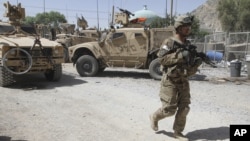ISLAMABAD — Coalition forces in Afghanistan say they are looking for ways to prevent so-called green-on-blue attacks, in which Afghan security forces turn their weapons on international troops.
International Forces spokesman Brigadier General Gunter Katz says several measures are being considered to put an end to the string of fatal insider attacks.
Those measures include enhancing the exchange of intelligence between the international and Afghan forces, more cultural training of both sides, and more counter-intelligence personnel within the Afghan National Security Forces.
“We are confident that those measures will contribute to the mitigation of insider threat incidents, and let me just reiterate that our campaign is on track and will not be affected,” said Katz.
About 45 international troops have been killed by insider attacks in Afghanistan this year. The attacks have thrown into question the ability of Afghan and coalition forces to work together as the country transitions to Afghan control.
Combat coalition troops are due to leave Afghanistan by the end of 2014.
Insider attacks have been blamed on militants infiltrating Afghan forces or on cultural differences settled with guns.
The U.S. military last week temporarily halted the training of 1,000 Afghan Local Police in order to improve their vetting procedures.
Afghan analyst Ahmad Idriss Rahmani says the results of this training have been mixed. “In southeast and south, there have been quite positive developments as these forces have been able to push back insurgents from communities," he stated. "But in other places, like north, there has been miserable developments because lots of criminals have joined the forces.”
Rahmani, who heads a research center in Kabul, said Afghan police officers are starting to profile police recruits and constantly check on them to see if they are being influenced or intimidated by militants.
General Katz said the training of Afghan National Police and the Afghan National Army, which is under the lead of the coalition forces, is not affected by the suspension.
International Forces spokesman Brigadier General Gunter Katz says several measures are being considered to put an end to the string of fatal insider attacks.
Those measures include enhancing the exchange of intelligence between the international and Afghan forces, more cultural training of both sides, and more counter-intelligence personnel within the Afghan National Security Forces.
“We are confident that those measures will contribute to the mitigation of insider threat incidents, and let me just reiterate that our campaign is on track and will not be affected,” said Katz.
About 45 international troops have been killed by insider attacks in Afghanistan this year. The attacks have thrown into question the ability of Afghan and coalition forces to work together as the country transitions to Afghan control.
Combat coalition troops are due to leave Afghanistan by the end of 2014.
Insider attacks have been blamed on militants infiltrating Afghan forces or on cultural differences settled with guns.
The U.S. military last week temporarily halted the training of 1,000 Afghan Local Police in order to improve their vetting procedures.
Afghan analyst Ahmad Idriss Rahmani says the results of this training have been mixed. “In southeast and south, there have been quite positive developments as these forces have been able to push back insurgents from communities," he stated. "But in other places, like north, there has been miserable developments because lots of criminals have joined the forces.”
Rahmani, who heads a research center in Kabul, said Afghan police officers are starting to profile police recruits and constantly check on them to see if they are being influenced or intimidated by militants.
General Katz said the training of Afghan National Police and the Afghan National Army, which is under the lead of the coalition forces, is not affected by the suspension.





